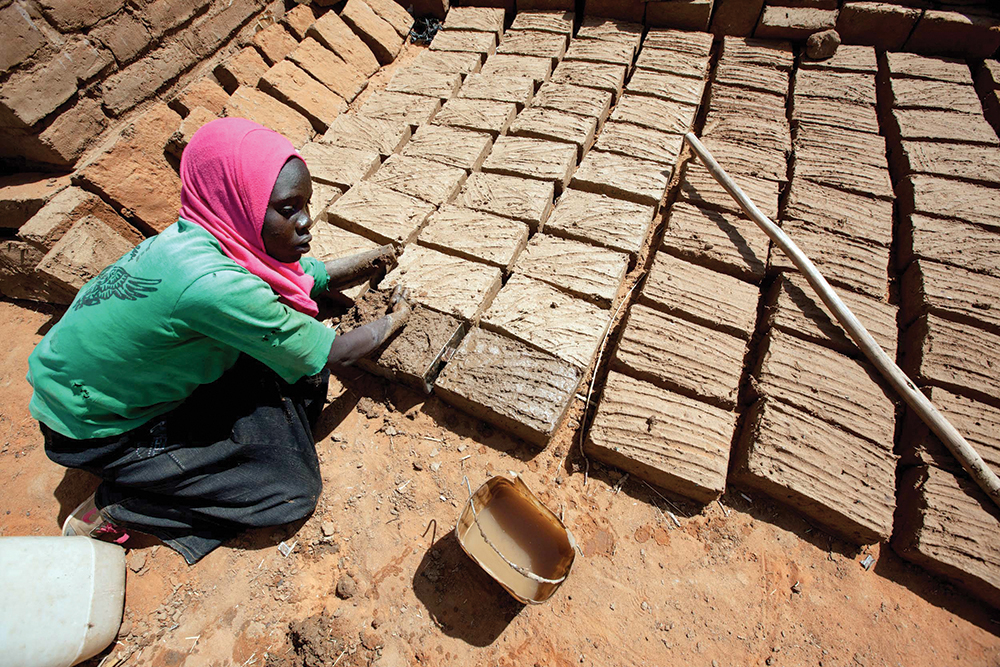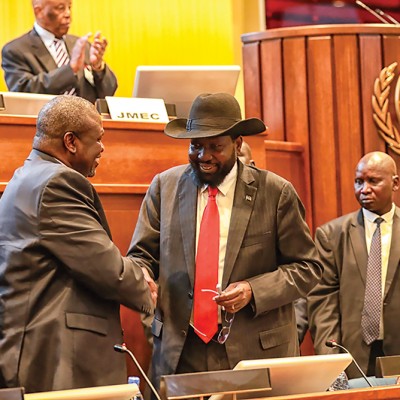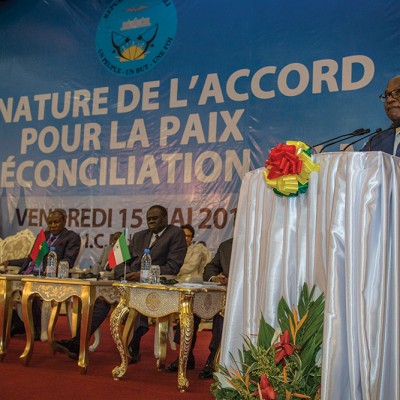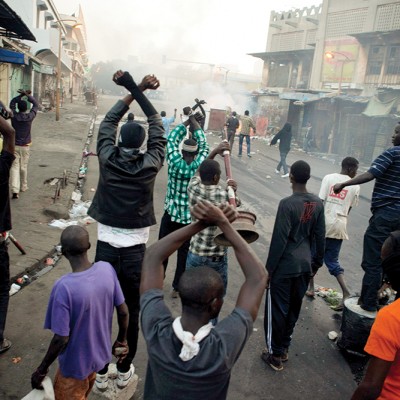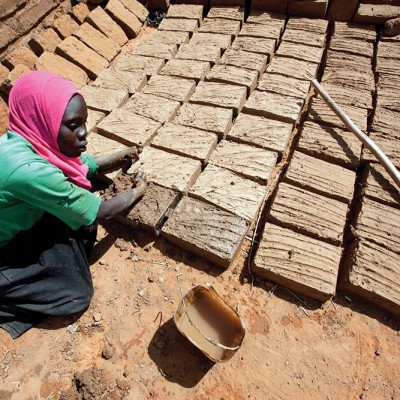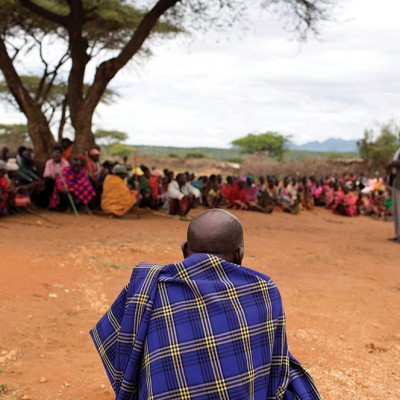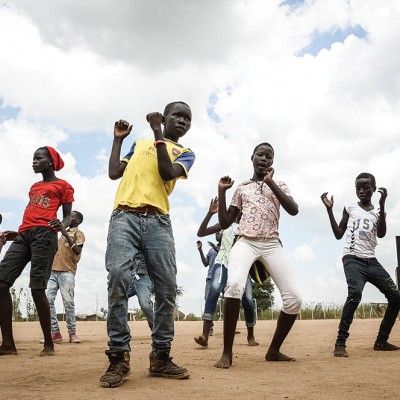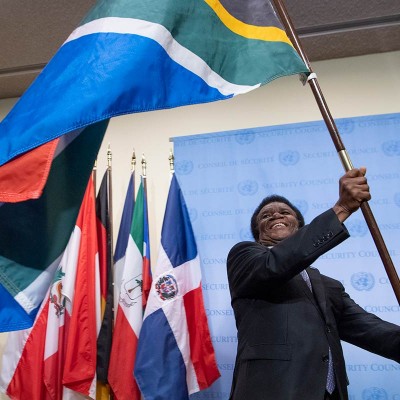Overview
The protracted conflict since 2003 in Darfur, Sudan, has resulted in massive loss of human lives and assets, disrupted livelihoods and led to severe food insecurity in some areas. Some 1.6 million internally displaced persons (IDPs) are registered as living in camps. For unregistered IDPs – that is, displaced people living in rural settlements and urban areas – estimates vary considerably, especially as there is no systematic registration of displacement outside of camps.1 IDPs and their host communities have limited livelihood options and often rely on unsustainable coping strategies, such as unmanaged cutting of trees and shrubs for fuelwood and charcoal production. This places an additional burden on Darfur’s fragile ecosystem and related livelihoods.2
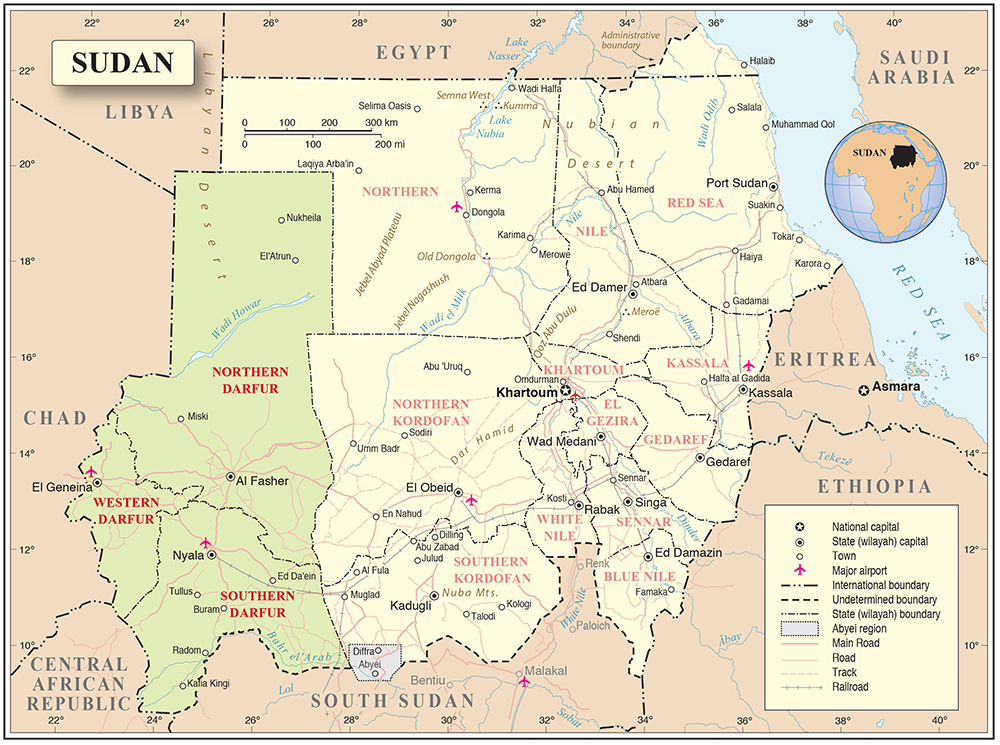
Climate change in Darfur has disrupted people’s lives by curtailing the availability of resources, thereby spurring greater competition and conflict. Confronted with the consequences of a brutal war, many people have embraced coping strategies – such as clearing forests to power the kilns for fire bricks – that have accelerated the impact of climate change and indirectly perpetuated a root cause of the conflict. Reversing this damage will be essential to Darfur’s sustainability in the longer term. The United Nations can offer significant support for this process by promoting better environmental management and empowering communities to confront climate-related vulnerability.3
Environmental degradation in Darfur has intensified in recent years, undermining the region’s future prospects. This degradation is primarily driven by two forces: climate change, and human impact on the environment. The deleterious effects of climate change are seriously compounded by the impact of humans on the environment. To some extent, this impact is the predictable result of rapid population growth, as greater numbers of people consume more resources. The ecosystem in Darfur, however, is particularly ill-equipped to absorb such growth in the absence of significant adaptations. Without positive changes, human impact will combine with climate change to facilitate the collapse of rural livelihoods and place untenable pressure on urban areas.
Environmental concerns have often been at the root of conflict in the region as people, especially farmers and pastoralists, clash over access to natural resources. But the scale of recent degradation has eclipsed previous shortages, severely destabilising a fragile ecosystem that for generations had balanced the needs of diverse livelihoods. The implications include deteriorations in the quality of life – such as access to water or forestry resources – as well as potentially irreversible damage to livelihoods and the likelihood of nearly constant conflict. Reversing this decline is critical to moving Darfur past the current crisis and ensuring its longer-term viability.
Human impact on the environment is most visible in the area of deforestation, which constitutes a substantial threat. Some forests around major cities have disappeared entirely. Darfur has the last remaining substantial forest cover in northern Sudan. These forests face serious threats from agriculture, population growth and the effects of conflict. Before the war broke out, tree cover in Darfur was already declining, with forests contracting at an average annual rate of over 1% between 1973 and 2006.4 Overall, Sudan has lost more forest cover than any other African country, and Darfur is clearly a major contributor to this trend. In fact, some forests around cities such as Nyala and El Geneina have disappeared entirely.
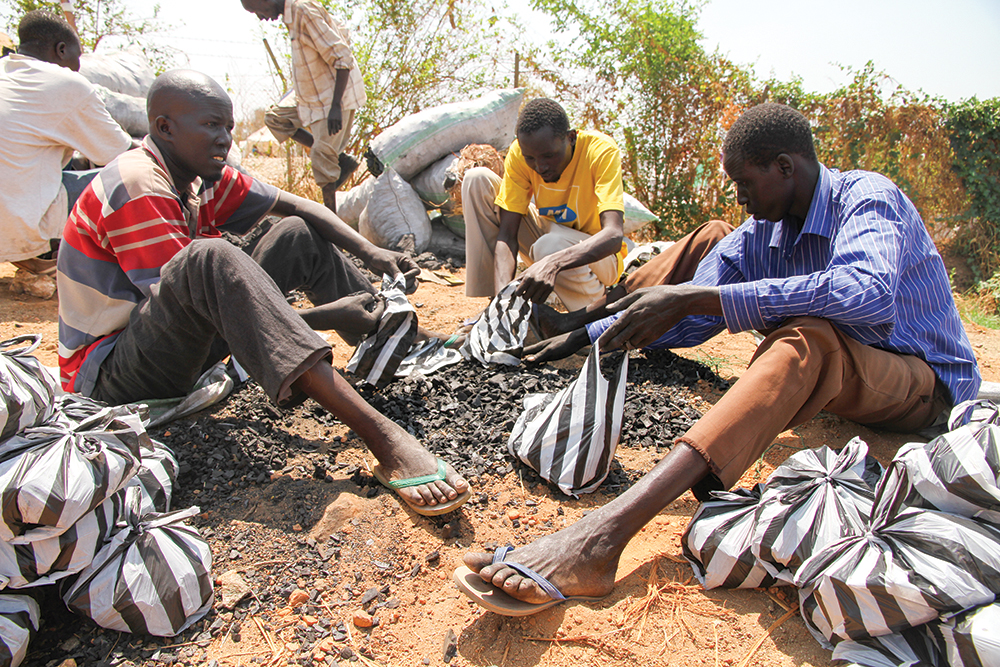
The biggest culprit driving deforestation is the enormous demand for construction and firewood. Domestic firewood needs have resulted in highly unsustainable deforestation rates. In the Kalma IDP camp near Nyala, for example, IDPs could once find adequate firewood within 15 kilometres of the camp. Today, they must travel 75 kilometres for the same purpose, or rely on firewood merchants who travel to them.5
In rural areas, pastoralists and farmers have also played a role in fuelling deforestation. For example, farmers have often cleared forests to claim new land for cultivation, or have supplemented their income by selling firewood or charcoal. Similar pressures on pastoralists have led to the same results, and many pastoralists take advantage of nomadic lifestyles to transport wood to urban areas, where it is in short supply.
Urbanisation, population growth and the effects of climate change have increased pressure on Darfur’s forests. But the conflict has intensified the toll on Darfur’s trees at the precise moment that thousands of families need new sources of income. Left unchecked, deforestation will likely intensify, and this calls for better forestry management.
UNAMID’s Work in Darfur
The United Nations–African Union Mission in Darfur (UNAMID) was established on 31 July 2007 with the adoption of Security Council resolution 1769.6 UNAMID has the protection of civilians as its core mandate, and is also tasked with contributing to security for humanitarian assistance, monitoring and verifying implementation of agreements, assisting an inclusive political process, contributing to the promotion of human rights and the rule of law, and monitoring and reporting on the situation along the borders with Chad and the Central African Republic (CAR).
In addition, based on the dire humanitarian situation in Darfur, UNAMID has been also implementing quick impact projects (QIPs)7 and community-based labour-intensive projects (CLIPs) in the areas of water and sanitation, education, health, rule of law and livelihoods. Since 2007, UNAMID has implemented in all Darfur states over 500 QIPs, worth over US$15 million, in the areas mentioned above.8 A number of these projects have addressed the unsustainable exploitation of forest resources; increased conflict over scarce forest and tree resources; exposure of women and girls to conflict-related sexual violence (CRSV) and sexual and gender-based violence (SGBV) while collecting fuelwood; the high cost of fuelwood and charcoal on the markets, if purchased, especially when used inefficiently; and health and safety risks associated with cooking on traditional three-stone fires.
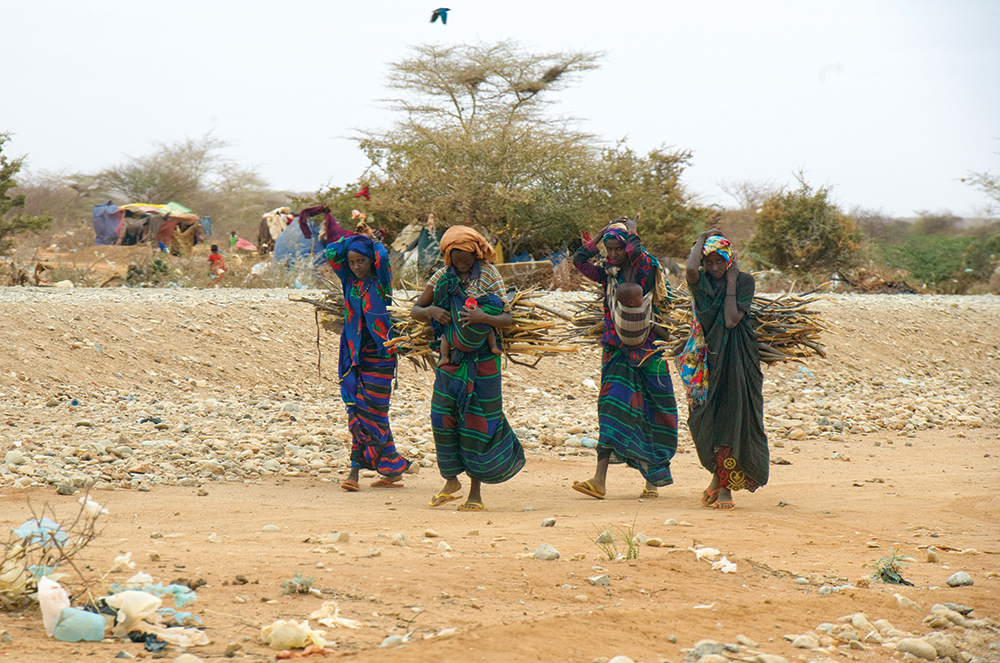
Implementation of Fuel-efficient Stoves in Darfur by UNAMID
More than two billion poor people across the developing world depend on wood energy for cooking and/or heating.9 In Darfur, firewood is by far the predominant source of household energy, especially in rural areas. Traditionally, people in Darfur living in villages are accustomed to having their meals cooked over the open fires of three-stone ovens, which are constructed as their name suggests: a pot is placed over three adjacent stones, with the fire burning below. Because this old stove design does not shield the fire from breezes, the flames burn strongly, quickly consuming firewood and sending up sparks that can set fire to homes made of wood, bamboo and straw. In addition, because the firewood is consumed quickly in the old stoves, those cooking with them must collect wood regularly, making long trips to forested areas and putting themselves at risk in the process. Beyond the risks to property and people, open-fire stoves have broader environmental implications. The heavy reliance on firewood as a source of cooking has jeopardised Darfur’s fragile environment, leading to deforestation and erosion.
In Darfur, the task of firewood collection falls to women. Reports of violent assault against women collecting firewood10 have prompted UNAMID to devise innovative solutions for protecting both women and the environment in Darfur. In May–October 2017, the mission’s Protection of Civilians/Humanitarian Liaison (PoC/HL) Section developed and implemented a project aimed at providing training to 800 rural and IDP women on the production of fuel-efficient stoves in one of the most conflict-sensitive areas in Darfur: Sortony, North Darfur.
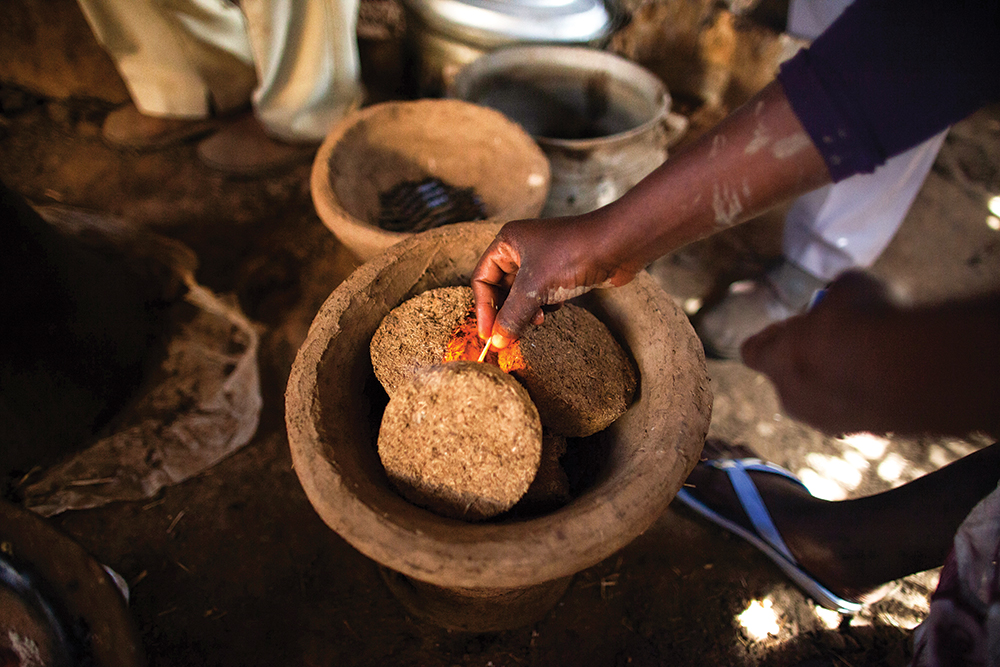
These fuel-efficient stoves are specifically designed to reduce fuel consumption and provide a substitute for the traditional three-stone fire. They can be made of mud, clay or metal, and they can use different types of fuels, such as fuelwood, charcoal, briquettes, biofuels, liquefied petroleum gas or kerosene. In addition, they reduce the exposure of women and girls to CRSV and SGBV, since they collect fuelwood less often. Since fuel-efficient stoves can be made fairly easily from local materials, and since they consume less wood than their old-style counterparts, their popularity is increasing. According to the Sudanese National Forests Corporation, the amount of firewood saved by using fuel-efficient stoves in comparison to traditional open-fire stoves is more than 50%.11
There is one very important aspect of general insecurity in many – if not all – areas where IDPs have settled. In some situations, danger lies just outside the camp limits. Armed persons from the groups that were responsible for forcing people to leave their homes in the first instance are present in the vicinity of the camps, creating fear and anxiety among the camp inhabitants. In spite of this danger, people are in desperate need of wood to cook their food. Women and girls – who are the traditional fuelwood gatherers – thus venture out of the camps and risk being attacked and abused by armed men.12
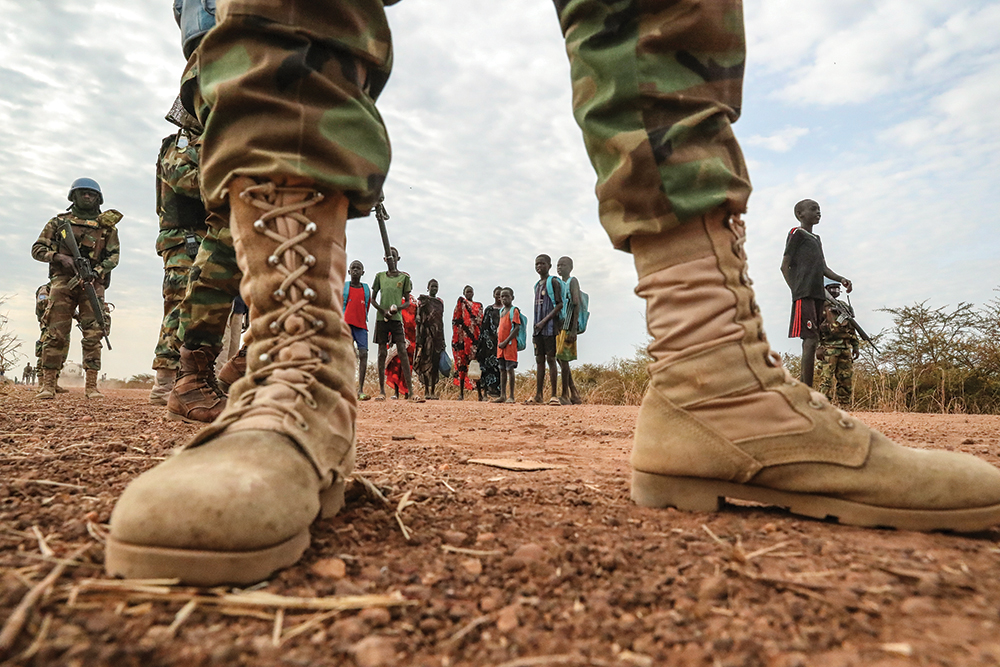
Fuel-efficient stoves are widely known for their potential to reduce the consumption of wood (or charcoal), if used correctly and consistently. Introduction of these stoves to camps or urban settlements can therefore be expected to reduce the number of times a person needs to collect wood for household cooking – which, in turn, should directly reduce the probability of exposure to CRSV and SGBV attacks. Therefore, a fuel-efficient stove programme with a stated objective of “protection of women from CRSV/SGBV” will not seek to measure the occurrences of CRSV/SGBV incidences, but will focus on reducing the frequency of collection trips outside of a camp and thus the probability of exposure to attacks and violence.
“I used to go out at least four times a month to forage for firewood,” explains Fatima Ibrahim, a 37-year-old West Darfur woman.13 Fatima describes that she was accustomed to walking long hours across the semi-arid land to get a bundle of firewood sufficient to cook for seven days. During these walks, she says, she had to come to terms with the potential security risks that she and other women faced while away from the village. Reports of violent assaults against women collecting firewood have prompted UNAMID to take action across Darfur by implementing patrols to watch over the women as they work. In addition to implementing these patrols, UNAMID has been promoting the fuel-efficient stoves to help reduce the need for women to travel outside their villages so frequently.
Impact
While the new stoves might be simple to construct, the potential impact of their design is far from trivial. Cooking fires emit greenhouse gases laced with sunlight-absorbing black carbon, which scientists say is the second-greatest contributor to climate change. In addition, exposure to cooking smoke leads to lower birth weights, childhood pneumonia and several other chronic illnesses.14
Fuel-efficient stoves reduce fuel consumption per meal and cut smoke emissions from the traditional fires used inside poorly ventilated dwellings. In addition, the materials used to make the mud stoves are available locally, helping to improve levels of replicability and cost-efficiency of the practice. Local production and sales of fuel-efficient stoves also become an income-generating activity for women, while decreasing the risks of gender-based violence they face when collecting fuelwood.
An evaluation of fuel-efficient stoves in Darfur confirmed that improved mud stoves have a beneficial impact in terms of enhancing livelihoods, nutrition and health, forest conservation and environmental protection, fighting climate change by reducing carbon emission, and reducing SGBV. Using fuel-efficient stoves increases the resilience of the livelihoods of groups at risk, especially for most vulnerable women and IDPs living in camps. Improved mud stoves are now widely used and training continues to be delivered by partners and local trainers, providing a durable solution in a protracted crisis situation.15
Another aspect of the fuel-efficient stoves is designed to increase the income of Darfuri households and reduce people’s dependence on humanitarian assistance. The projects implemented by UNAMID have allowed the beneficiaries – women, men and youth – to learn techniques to make fuel-efficient stoves. While a single household can save an average of 3.99 Sudanese pounds per day on firewood by using the new stoves, the project beneficiaries can also earn an income of 130 Sudanese pounds each month by making and selling the stoves.
The impact of the fuel-efficient stove project cannot be underestimated. To summarise:
- Up to 60% of fuelwood traditionally consumed by the commonly used three-stone fire is saved due to use of fuel-efficient stoves.16
- Project beneficiaries are trained to produce fuel-efficient stoves using easily accessible, low-cost local materials, and they generate additional income by making and selling the stoves.
- A single household saves an average of 99 Sudanese pounds per day on firewood by using the new stoves.
- Exposure to SGBV faced by women and girls is reduced, since they collect fuelwood less often.
- Women and children’s health is better protected from the smoke emissions of traditional stoves.
- Containment of cooking fires, as a result of using fuel-efficient stoves, reduces safety risks.
- Vegetation cover is improved, due to tree planting and reduced fuelwood extraction.
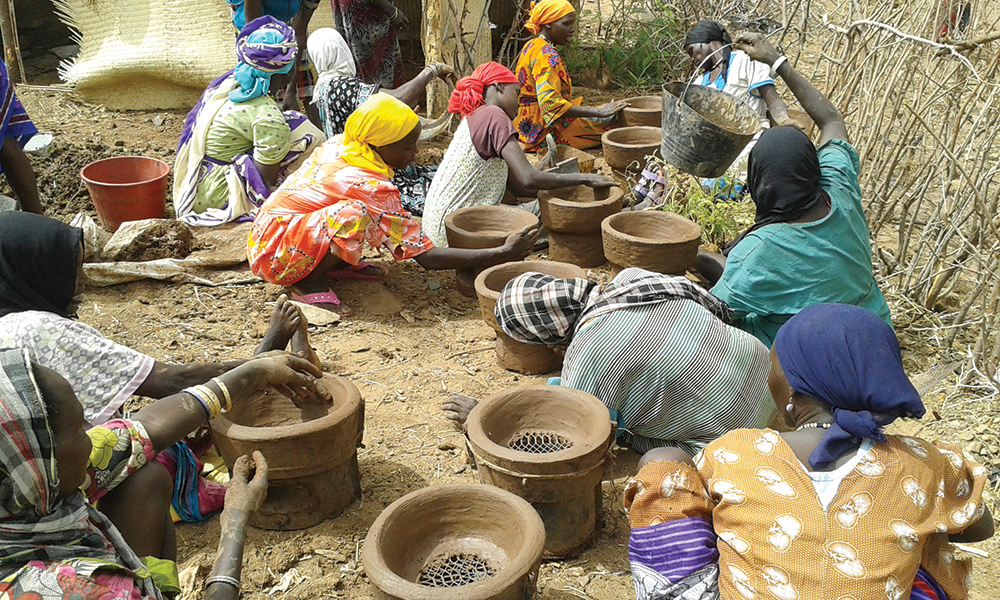
Way Forward
Deforestation poses an enormous threat to Darfur, and maladaptive livelihood strategies and ongoing conflict displacements have dramatically accelerated the toll on Darfur’s trees. Most Darfuris rely on firewood or charcoal to meet their energy needs, leading to untenable rates of deforestation. To counteract this effect, UNAMID continues to promote alternative technologies that can attenuate the impact of these needs on natural resources through promoting the use of fuel-efficient stoves in Darfur.
Fuel-efficient stoves have been successfully adopted by the project beneficiaries. The life span of the improved mud stove is between six and 36 months. Fuel-efficient stoves clearly have a major role to play in protecting the environment and its deforestation. To this end, UNAMID and its partners should continue to promote the use of fuel-efficient stoves in the region.
In addition, the successful experience of UNAMID could be easily replicated by other peacekeeping missions facing environmental and other challenges in their areas of operation.17 Replicability and upscaling can be further ensured through lessons learnt:
- Pursue awareness-raising among decision-makers and communities on the benefits of fuel-efficient stoves.
- Clarify the link between household energy consumption, impacts on surrounding forests and environment and the need for rational use of available resources to meet the demand of both the current population and future generations.
- Provide flexible stove designs that can be adjusted to local conditions, based on consultations with community stakeholders – especially women, who are the main users.
- Create a core training team (if possible, within the community) to monitor, report and share the results with stakeholders and researchers.
- Identify focal points that communities can consult on the fabrication and use of fuel-efficient stoves in each location.
Fuel-efficient stoves have proved to play an important role in saving forests and improving women’s safety and security in humanitarian crises and post-conflict situations. However, such initiatives cannot be sustainable in the long term if they are not coupled with nationally owned environmental protection strategies and effective rule of law.
Endnotes
- United Nations Office for the Coordination of Humanitarian Affairs (2018) ‘Sudan 2018 Humanitarian Needs Overview’, Available at: <https://reliefweb.int/sites/reliefweb.int/files/resources/Sudan_2018_Humanitarian_Needs_Overview.pdf>.
- Food and Agriculture Organization of the United Nations (2015) ‘Fuel-efficient Mud Stoves in Darfur, Sudan’, Available at: <http://www.fao.org/3/a-i5585e.pdf>.
- Office of the UN Resident and Humanitarian Coordinator (2010) ‘Beyond Emergency Relief: Longer-term Trends and Priorities for UN Agencies in Darfur’, Available at: <https://postconflict.unep.ch/publications/sudan/Darfur_recovery_beyond_emergency_relief_2010.pdf>.
- Ibid.
- Ibid.
- United Nations Security Council (2007) ‘2007 Resolution 1769 (2007)’, Available at: <https://www.securitycouncilreport.org/atf/cf/%7b65BFCF9B-6D27-4E9C-8CD3-CF6E4FF96FF9%7d/CAC%20SRES%201769.pdf>.
- United Nations Peacekeeping (2017) ‘Quick Impact Projects for Communities’, Available at: <https://peacekeeping.un.org/en/quick-impact-projects-communities>.
- United Nations–African Union Mission in Darfur (2013) ‘UNAMID Acting Chief Discusses with Wali Tibin Recent Developments in Central Darfur’, Available at: <https://unamid.unmissions.org/unamid-acting-chief-discusses-wali-tibin-recent-developments-central-darfur>.
- Food and Agriculture Organization of the United Nations (2016a) ‘Cooking up a SAFE Solution: Fuel-efficient Stoves for Displaced Communities in South Sudan’, Available at: <http://www.fao.org/gender/projects/detail/en/c/449355/>.
- Patrick, Erin (2007) Sexual Violence and Firewood Collection in Forced Migration Review, 27, pp. 40–41, Available at: <https://www.fmreview.org/sites/fmr/files/FMRdownloads/en/sexualviolence/patrick.pdf>.
- Rijal, Emadeldin (2012) Fuel-efficient Stoves Protect Women, Voices of Darfur. United Nations–African Union Mission in Darfur, November, Available at: <https://reliefweb.int/sites/reliefweb.int/files/resources/Voices%20of%20Darfur%20November%202012.pdf>.
- ProAct Network (2008) ‘Assessing the Effectiveness of Fuel-efficient Stove A Darfur Wide Review’, Available at: <https://wedocs.unep.org/bitstream/handle/20.500.11822/22124/darfur_FES.pdf>.
- Rijal, Emadeldin (2012) op.
- Ibid.
- Food and Agriculture Organization of the United Nations (2016b) ‘How Fuel-efficient Stoves Improve Food Security and Gender Equality in Countries Affected by Crises’, Available at: <http://www.fao.org/resilience/news-events/detail/en/c/396956/>.
- Food and Agriculture Organization of the United Nations (2015) op.
- United Nations–African Union Mission in Darfur (2018) Protective Focus on Durable Solutions for Displaced Population.

